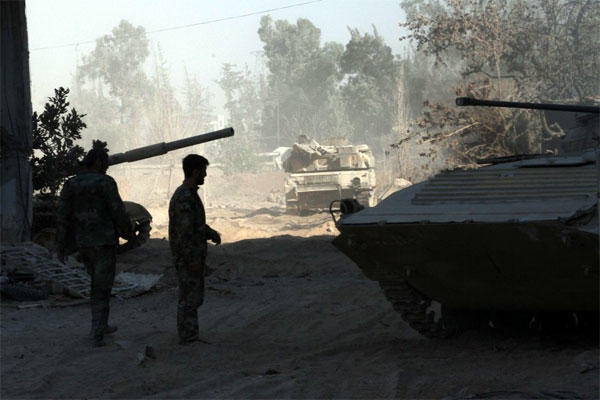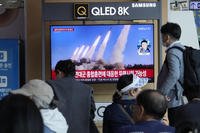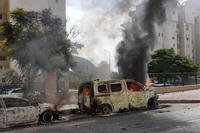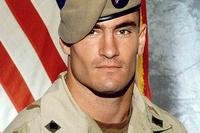Under threat of U.S. attack, Syria reversed course Sunday and agreed to allow United Nations technical teams to inspect the site outside Damascus where hundreds were reportedly killed in an alleged chemical weapons strike by forces loyal to the regime of President Bashar al-Assad.
The Syrian about face came as President Obama weighed options on the use of force, including four Arleigh-Burke class destroyers in the Mediterranean carrying hundreds of Tomahawk cruise missiles.
United Nations officials said that inspection teams already on the ground in Syria were prepared as early as Monday to go to the eastern Damascus suburbs of weapons Ain Tarma, Zamalka and Jobar in search of evidence of the use of chemical weapons.
Gruesome videos of the aftermath of Aug. 21 rocket attacks on the area showed victims who appeared to be suffering the effects of chemical weapons, possibly the nerve agent Sarin. Humanitarian groups said the death toll had risen to more than 300 while opposition forces said more than 1,000 may have been killed.
Syria had balked at allowing the UN teams to go to the site, saying that rebel forces were responsible for the attacks in an attempt to discredit the regime, but Assad’s government relented Sunday and said the inspections would go forward.
“The Government of the Syrian Arab Republic affirmed that it will provide the necessary cooperation, including the observance of the cessation of hostilities at the locations related to the incident,” the Syrian regime said in a statement read on state television.
“All relevant parties equally share the responsibility of cooperating in urgently generating a safe environment for the mission to do its job efficiently,” the statement said.
Defense Secretary Chuck Hagel said the U.S. was still gathering evidence on the use of chemical weapons while readying U.S. forces for possible action.
"When we have more information, that answer will become clear," Hagel said in Kuala Lumpur, Malaysia, where he was on a regional swing to meet with Asian defense ministers on the U.S. “rebalance” of forces to the Pacific.
Senior defense officials traveling with Hagel have stressed on background that neither the ongoing crises in the Mideast nor the defense budget cuts under the sequestration process would deter the Pentagon from pursuing the so-called “Pacific pivot.”
At a news conference in Kuala Lumpur, Hagel said that "President Obama has asked the Defense Department to prepare options for all contingencies. We have done that."
"Again, we are prepared to exercise whatever option, if he decides to employ one of those options," Hagel said a day after Obama met for four hours at the White House to discuss possible military action with his top national security team including Vice President Joe Biden and CIA Director John Brennan. Hagel participated in the meeting by secure video link.
One of the options was the U.S. Sixth Fleet, which has four destroyers in the Mediterranean – the USS Mahan, the Gravely, the Barry and the Ramage. The Mahan had been scheduled to return to its homeport in Norfolk, Va., but was ordered to remain on station after the alleged chemical attacks.
Each destroyer is equipped with about 50 sub-sonic and highly accurate Tomahawk cruise missiles carrying 1,000 pound conventional warheads. Ohio-class submarines carrying Tomahawks were also in the Mediterranean. A combination of destroyers and submarines was used in the 2011 Tomahawk attacks on Libya.
U.S. warplanes based in the region could join in an attack using stand-off missiles to avoid Syrian air defenses.
The likely targets would be Syrian military and government sites, command-and-control centers, and airfields. Direct attacks on known sites where Syria stockpiles chemical weapons would risk spreading toxic agents and so-called collateral damage to civilians.
On the Sunday talk shows, lawmakers from both parties said U.S. military action was likely, given Obama’s statement more than a year ago that the use of chemical weapons was a “red line” for U.S. policy.
“I think we have to respond,” Sen. Bob Corker, R-Tenn., a member of the Senate Armed Services Committee, said on Fox News Sunday. “I think we will respond in a surgical way” with limited strikes to avoid wider U.S. involvement in a civil war, Corker said. But he suggested that Obama should wait until Congress returns from recess next month to endorse military action.
Rep. Eliot Engel, D-N.Y., who received a letter from Gen. Martin Dempsey, chairman of the Joint chiefs of Staff, cautioning against the use of force, said “I think we will have to act rather quickly,” and seek Congressional approval later.
Sen. Jack Reed, D-R.I., also a member of the Senate Armed Services Committee, said the U.S. must be sure chemical weapons were used before acting. “We have to verify that it was directed by the Assad regime,” Reed said on CBS’ “Face The Nation.”
On the same program, retired Army Gen. Colin Powell, the former chairman of the Joint Chiefs of Staff and former Secretary of State, urged Obama to be wary of denials from Assad. Powell said he has dealt personally with Assad and “he is a pathological liar.”
However, Powell said the U.S. also must be wary of believing that limited strikes will alter the course of a civil war. “We shouldn’t go around thinking we can make things happen,” Powell said, but “we can influence things.”
The alleged chemical attacks outside Damascus have worsened a refugee crisis that has already sent more than 1.5 million refugees fleeing to neighboring countries, according to regional media.
The Jordan Times newspaper reported Saturday that thousands of new Syrian refugees had been stranded in their efforts to reach safe haven in Jordan after last Wednesday’s attacks.
“Hundreds of families are arriving from Damascus to the border region each day, but they can’t cross into Jordan because of the shelling” by Assad’s forces, said Ahmad Al Saad, an activist with the Local Coordination Committees in the border town of Tal Shihab, the Jordan Times reported.
Tal Shihab has reportedly received an influx of over 5,000 displaced people since Wednesday’s attacks, the newspaper said.
The U.S. currently has about 1,000 troops on the ground in Jordan, backed by F16 attack aircraft and Patriot missile batteries, to shore up the government of King Abdullah II.
Several factors were under consideration as the U.S. weighs military options, including Obama’s preference to have UN approval or backing from an international coalition before launching an attack. Authorization from the UN Security Council was unlikely, since Russia, Assad’s main ally, holds veto power in the Council.
In a CNN interview last Friday, Obama said that “If the U.S. goes in and attacks another country without a UN mandate and without clear evidence that can be presented, then there are questions in terms of whether international law supports it, do we have the coalition to make it work?”
Another factor in the timing of a possible U.S. strike was the presence in Syria of the 20-member UN technical team led by Swedish chemical weapons expert Ake Sellstrom. In 2003, the U.S. waited for UN inspectors, who had found no evidence of weapons of mass destruction in Iraq, to leave Baghdad before launching the invasion in March of 2003.
The UN in Damascus has a mandate to inspect the sites of three previous alleged attacks with the nerve agent Sarin – the village of Khan al-Assal just west of the embattled northern city of Aleppo and two other sites that were not disclosed for security reasons.
UN Secretary General Ban Ki-moon has been pressing Assad to allow the UN team access to the site in the Damascus suburbs and over the weekend sent UN High Representative for Disarmament Affairs Angela Kane to join the team.
Following the attacks outside Damascus last Wednesday, three hospitals near Damascus reported 355 deaths out of about 3,600 admissions with nerve gas-type symptoms, according to the respected medical charity Medecins Sans Frontieres (Doctors Without Borders).
MSF has no staff of its own in the Damascus region, but has been supporting hospitals and medical networks there since 2012, according to Reuters.
“The reported symptoms of the patients, in addition to the epidemiological pattern of the events — characterised by the massive influx of patients in a short period of time, the origin of the patients, and the contamination of medical and first aid workers — strongly indicate mass exposure to a neurotoxic agent,” said MSF director of operations Bart Janssens in a statement.






























